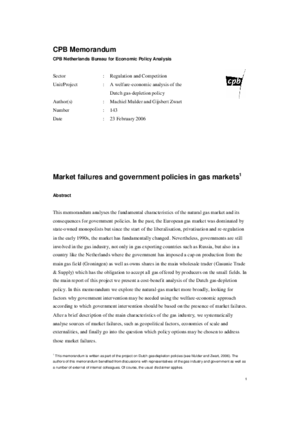Market failures and government policies in gas markets
Nevertheless, governments are still involved in the gas industry, not only in gas exporting countries such as Russia, but also in a country like the Netherlands where the government has imposed a cap on production from the main gas field (Groningen) as well as owns shares in the main wholesale trader (Gasunie Trade & Supply) which has the obligation to accept all gas offered by producers on the small fields. In the main report of this project we present a cost-benefit analysis of the Dutch gas-depletion policy.
In this memorandum we explore the natural-gas market more broadly, looking for factors why government intervention may be needed using the welfare-economic approach according to which government intervention should be based on the presence of market failures. After a brief description of the main characteristics of the gas industry, we systematically analyse sources of market failures, such as geopolitical factors, economies of scale and externalities, and finally go into the question which policy options may be chosen to address those market failures.
